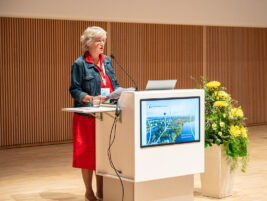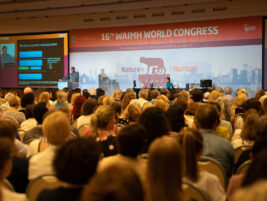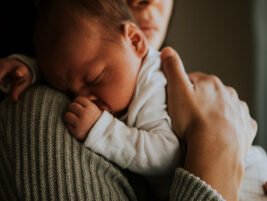Joy Osofsky, Hiram Fitzgerald, Miri Keren, and Kaija Puura joined together as developers, contributors, and editors for the 2024 WAIMH Handbook of Infant and Early Childhood Mental Health, Volumes 1 and 2. Celebrating the remarkable international growth of WAIMH, the new two-volume WAIMH Handbook includes contributions by authors from 16 countries from around the world. We want to thank the many contributors to the Handbook volumes.
- Volume 1: Infant Development, Neurobiological Influences, Parenting and Caregiving; and;
- Volume 2: Cultural Context of Parenting and Infant Mental Health, Infancy and Early Childhood Mental Health Assessment; Clinical Infant Mental Health.
The editors, all of whom have also contributed chapters, have made much effort to be sensitive to individual differences, diversity, and equity, including work in the field of infant and early childhood mental health that is being implemented in different settings around the world. As readers will experience, we have intentionally joined scientific and clinical perspectives as well as policy issues related to linkages between general infant development and infant mental health, and, within contexts of equity, diversity, and indigenous knowledge.
We want to express thanks for the support, encouragement, and interest of WAIMH Board members from around the world. And we want to thank Springer Nature Publishers who have been very supportive from the beginning and throughout this endeavor, showing flexibility when needed and consistent support and efficiency.
It is important to note, when considering an understanding of infant and early childhood mental health at this time, that in August 2021, about a year and a half into the COVID-19 pandemic around the world, we had all been working virtually as in-person meetings were cancelled, and lockdowns and social distancing were imposed to ensure the best chances for safety from COVID. We knew that this was a very difficult time for all and were very concerned about the growth and development of infants and young children and the stress that families and communities were feeling, especially those with fewer resources. Inequities were evident in the loss of income and food insecurity combined with more serious illnesses and deaths for families with fewer resources. Also for young children, life had been turned “upside down” with many not being able to be with extended family or friends and losing direct contact with other significant supportive adults in their lives that are so important for positive development. For those old enough, virtual schooling and support was all that was available if families had the resources to help teach children at home. Further, there was much stress and uncertainty and, unfortunately, for many children, losses of parents, grandparents, elders and other caregivers.
We feel as editors that it is important to recognize that the world for infants, toddlers, their parents, communities, and other caregivers has changed a great deal since the publication of the first WAIMH Handbook in some good ways, but also with many challenges, especially in the past 3 years during the COVID-19 pandemic. With closed nurseries and childcare centers, parents and other caregivers reported greater levels of stress, living differently, and often being less available to their young children. Also, parents, caregivers and elders became sick, and in some cases died. We know that the indirect effects on small children can last a lifetime. And the impact has been much greater on those with fewer resources in the first place. As was shared by President Campbell Paul following the successful 18th WAIMH Dublin Congress in 2023 and other international meetings that he attended, young children have been experiencing many uncertainties related to co-existing concerns in addition to the pandemic such as exposure to wars, natural disasters, and other traumatic experiences. As he emphasized, attention needs to be given to how to spread resources in different ways to reach the most vulnerable children, families and communities around the world.
We also recognize that there have been many positive developments with much-increased awareness and knowledge being gained about brain development, infant and early childhood mental health, and even clinical diagnoses since the last WAIMH Handbook was published more than 20 years ago. We have had the opportunity both virtually and more recently with the 2023 Dublin Congress to learn and share this new knowledge. We are hopeful that the development and sharing of the new WAIMH Handbook will also contribute to discussions around the world related to new understanding and ways to help and support the growth of the field. As we did in the first WAIMH Handbook, we again join scientific, clinical, and cultural perspectives with a strong emphasis on policy issues that need to be addressed. We worked diligently to represent international knowledge and perspectives to reflect, as President Campbell Paul stated, the 48 countries and regions that were represented at our 2023 18th World Congress.
Just as we shared when the first WAIMH Handbook was published, we say again that although we have learned much during the past two decades, these volumes represent steps in our knowledge and not an end to our growth. We hope that the readers will use the Handbook to encourage discussion about the field of infant and early childhood mental health (IECMH). The editors have devoted much of their professional lives to imparting knowledge in this area; establishing training programs so that students and colleagues can learn what is known, presenting both within their countries and internationally about IECMH, and spending many hours evaluating and providing clinical services for young children and families.
As we shared in our earlier Handbooks, we are hopeful that these volumes will provoke discussion across disciplines and across national, regional, and cross-cultural boundaries so that we all will understand more about infant and early childhood development, mental health, and ways to support infants, young children, families and communities. We are hopeful that this two-volume Handbook will provide and integrate more of the knowledge that is needed to discuss, share, and hopefully solve some of the difficult issues that infants, young children and families are facing around the world.
Print a flyer of WAIMH Handbook of Infant and Early Childhood Mental Health, Volume 1
Print a flyer of WAIMH Handbook of Infant and Early Childhood Mental Health, Volume 2
References
Original WAIMH Handbook: 4 Volumes
Osofsky, J. D., & Fitzgerald, H. E. (Eds.) (2000). Handbook of infant mental health, (Vol. 1): Perspectives on infant mental health. New York: John Wiley & Sons.
Osofsky, J. D., & Fitzgerald, H. E. (Eds.) (2000). Handbook of infant mental health (Vol. 2): Early intervention, evaluation, and assessment. New York: John Wiley & Sons.
Osofsky, J. D., & Fitzgerald, H. E. (Eds.) (2000). Handbook of infant mental health (Vol. 3): Parenting and childcare. New York: John Wiley & Sons.
Osofsky, J. D., & Fitzgerald, H. E. (Eds.) (2000). Handbook of infant mental health (Vol. 4). Infant mental health in groups at risk. New York: John Wiley & Sons.
New WAIMH Handbook on Infant and Early Childhood Mental Health
Osofsky, J. D., Fitzgerald, H. E., Keren, M., & Puura, K. (2024). WAIMH Handbook of Infant and Early Childhood Mental Health (Vol 1): Biopsychosocial factors affecting infants and early childhood. Cham, Switzerland: Springer Nature Switzerland AG.
Osofsky, J. D., Fitzgerald, H. E., Keren, M., & Puura, K. (2024). WAIMH Handbook of Infant and Early Childhood Mental Health (Vol 2): Cultural Context, Prevention, Intervention, and Treatment. Cham, Switzerland; Springer Nature Switzerland AG.
Authors
Joy Osofsky, USA








